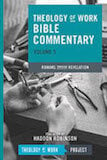Woven Into God’s Story of Darkness and Light, Part 1
Daily Reflection / Produced by The High Calling
For you were once darkness, but now you are light in the Lord. Live as children of light.
Ephesians 5:8
Ephesians 5:8 proclaims: "For you were once darkness, but now you are light in the Lord. Live as children of light." By using the imagery of darkness and light in this way, Ephesians weaves us into the biblical story, a story in which the motif of darkness and light features prominently.
The imagery of darkness and light takes us back to the very first day of creation in the opening verses of Genesis. There, God speaks light into existence, seeing that the light is good and separating the light from the darkness (Gen. 1:3-5). In Exodus, one of the plagues covers Egypt with darkness as a sign of God's judgment (Exod. 10:21-22). Later in Exodus, God leads his people by a pillar of fire at night, "to give them light" for safe travel (Exod. 13:21). The prophet Isaiah describes the lostness of humanity that has turned away from God, and therefore "see only distress and darkness and fearful gloom, and they will be thrust into utter darkness" (Isa. 8:22).
But Isaiah also offers hope through a glimpse of the future: "The people walking in darkness have seen a great light; on those living in a land of deep darkness a light has dawned" (Isa. 9:2). Someday, the Lord will "turn the darkness into light" before his people (Isa. 42:16). In that day, God will send his servant as a "light for the Gentiles" (Isa. 42:6; 49:6). Even though "darkness covers the earth," the nations will come to the light of God's people "and kings to the brightness of your dawn" (Isa. 60:2-3). In the future, "the LORD will be your everlasting light, and your days of sorrow will end" (Isa. 60:19-20).
Ephesians 5:8 echoes the language of Isaiah, and in so doing we become part of the biblical story. But now, those who live without God are not just in darkness. They are darkness. And those who live with God are not just in the light. They are light. In tomorrow's reflection, we'll look more closely at this striking development in the use of light/dark imagery. For now, though, I'd like to invite you to reflect on how your own life is part of God's story, the grand story of Scripture. You might find the following questions to be helpful.
QUESTIONS FOR FURTHER REFLECTION: To what extent do you see your life as part of God's story? When you think of great biblical themes and motifs, like darkness and light, do these help you to make sense of your life? If you were to think of yourself as a character in God's story, how might you live differently today?
PRAYER: Gracious God, thank you for telling your grand story in Scripture, beginning with creation, with light and darkness. Thank you for choosing me as a character in your story, for including my own story as one small chapter in your grand narrative. Help me, Lord, to see myself this way, to see my life as part of your life, to see my story as a small but essential part of your story. May I live out my part today. To you be all the glory! Amen.
Social Justice at Work
When God asks us to take care of the orphan, widow, and the poor, what does that mean for our workplaces? How do we follow a social justice mandate in our offices, schools, warehouses and retail establishments? And how does it change our world when social justice works the way God intended?
In the series Social Justice at Work, The High Calling explores social justice in the places we work and the ways we work. Join us as we discuss how our calling to the "least of these" affects us outwardly in our jobs, and inwardly as we perform our jobs, via theme-related Bible reflections, featured articles, and discussion starters. We encourage you to add your questions, concerns and comments, engage with us on social media (especially Twitter and Facebook), and invite your friends and colleagues to do the same.






